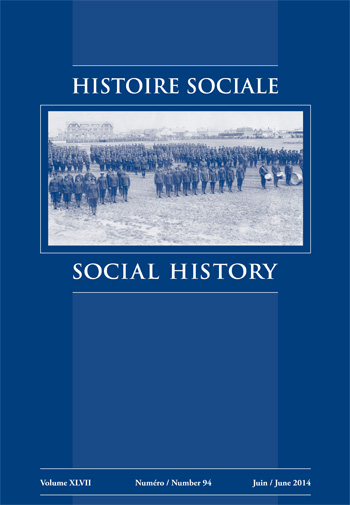“Black Horror on the Rhine”: Idealism, Pacifism, and Racism in Feminism and the Left in the Aftermath of the First World War
DOI:
https://doi.org/10.1353/his.2014.0034Abstract
In the aftermath of the First World War, a storm of protest met the stationing of colonial African troops in the occupied German territories. The campaign, spearheaded by legendary Congo reformer Edmund Dene Morel, influenced a broad spectrum of leftists, feminists, anti-imperialists, and pacifists in Great Britain, the United States, and Canada. In the United States and Canada the mainstream labour movement—the American Federation of Labor in the United States and its Canadian affiliate the Trades and Labour Congress—generally did not respond to Morel’s appeal. In contrast, idealistic leftists, feminists, anti-imperialists, and peace activists—men and women most committed to the creation of a world without war, racial prejudice, and gender inequality—took up Morel’s anti-imperialist and blatantly racist campaign. This article seeks to explain how this seeming contradiction came to be.
Dans la foulée de la Première Guerre mondiale, une tempête de protestations s’est élevée contre le stationnement de troupes coloniales africaines dans les territoires allemands occupés. La campagne, dirigée par Edmund Dene Morel, légendaire réformateur du Congo, a influencé un large éventail de gauchistes, de féministes, d’anti-impérialistes et de pacifistes en Grande-Bretagne, aux États-Unis et au Canada. Aux États-Unis et au Canada, les courants principaux du mouvement syndical – la fédération américaine du travail et son affilié canadien le Congrès des métiers et du travail – n’ont de façon générale pas répondu à l’appel de Morel. En revanche, les gauchistes, féministes, anti-impérialistes et pacifistes – autant d’hommes et de femmes idéalistes, engagés dans la création d’un monde sans guerre, sans préjugés raciaux et sans inégalités entre sexes – ont adopté1 la campagne anti-impérialiste et ouvertement raciste de Morel. Le présent article cherche à expliquer cette contradiction apparente.


